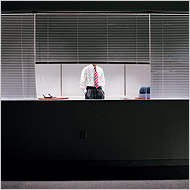Friday, December 29, 2006
Call Me An Office-Park Populist

In last Sunday's New York Times, Jacob Hacker - author of The Great Risk Shift - counters prevailing notions that white collar voters voted Democratic this year just because of Iraq and Republican corruption. He asserts that white collar voters are as concerned about unemployment and the lack of health insurance among working Americans as anyone else, and that they voted for Democratic candidates not in spite of, but because of, their emphasis on these issues. He cites the example of Jim Webb of Virginia, who won heavily among white collar voters in the Virginia suburbs of Washington, D.C. even though his main goal was to "bring true fairness back to economic life."
Hacker goes on to say that economic insecurity threatens even the most highly educated of white collar workers. For instance, computer science grads who may have gotten high starting salaries in the 90's are now struggling to get by on flat incomes and short-term contracts devoid of benefits, while they train foreign labor to take over their jobs. Just because these individuals are vulnerable doesn't mean that they are stupid and lazy and shortsighted, as most neo-con apologists for corporate ruthlessness would contend. Often, the most vulnerable workers are those who invested the most in higher education and attached themselves to what seemed at the time to be the most forward-looking careers. Their skills can be highly specialized, requiring very expensive training. Once the market for those skills disappears, not only do their jobs vanish - all the money they spent on training for those jobs is lost as well, sometimes even before their student loans are completely paid off. It may be easy to assess which career paths were losers in hindsight, but it is impossible to guess in advance which careers will lead to prosperity and happiness and which will result in thwarted and precarious lives. Hence, educated American workers can never be sure how their skills will serve them in the future.
Hacker admits that the repercussions of the rising insecurity of the middle class are far from clear. Most white collar workers don't want to destroy the system, and are themselves uncertain where to turn. It does, however, shift the balance of the debate from "what the prosperous many should do for the dispossessed few" to what anxious Americans from all walks of life must do to safeguard the economic security of one another.
"The Rise of the Office-Park Populist" from The New York Times

